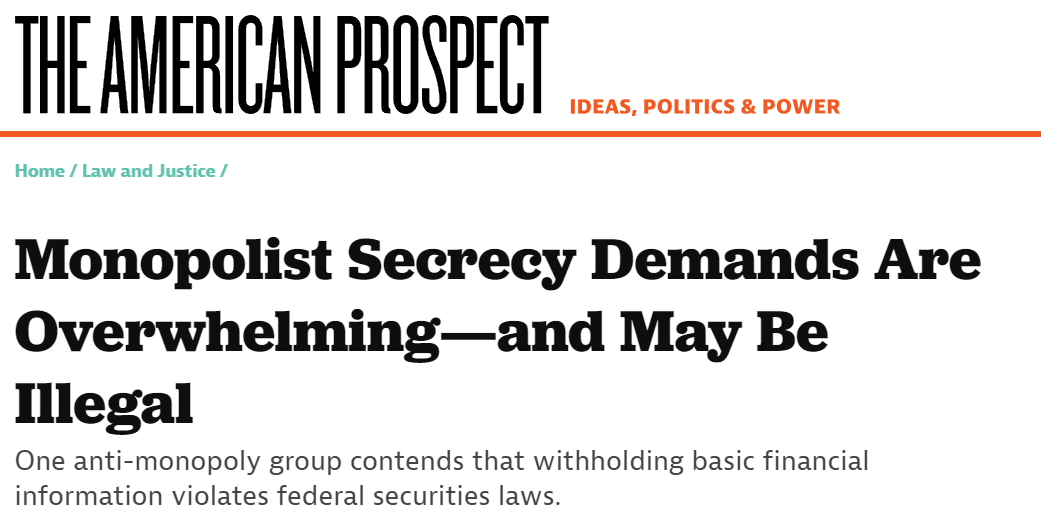Welcome to DU!
The truly grassroots left-of-center political community where regular people, not algorithms, drive the discussions and set the standards.
Join the community:
Create a free account
Support DU (and get rid of ads!):
Become a Star Member
Latest Breaking News
Editorials & Other Articles
General Discussion
The DU Lounge
All Forums
Issue Forums
Culture Forums
Alliance Forums
Region Forums
Support Forums
Help & Search
General Discussion
Related: Editorials & Other Articles, Issue Forums, Alliance Forums, Region ForumsMonopolist Secrecy Demands Are Overwhelming--and May Be Illegal

https://prospect.org/justice/2023-09-29-monopolist-secrecy-demands-overwhelming-illegal/

A common demand that recurs across challenges to corporate power, from union strikes to antitrust cases, is forcing companies to “open the books” and unspool their webs of financial secrets for the public to see. In the U.S. v. Google trial, the government’s efforts to pull back the curtain on key company documents critical to its case have been especially difficult. Google’s legal defense team has obstructed at every turn, objecting to the unsealing of documents and pushing for closed-court sessions, which choke off public access entirely. At the outset of the trial, Google was even in hot water for tampering with evidence by deliberately turning off its chat history, which drew a sanction from a California court but not yet from the D.C. district court.
Curtailed public access to the trial has become a defining story in its own right for the first three weeks of the trial. Several attorneys involved in the case and outside legal observers have called the level of secrecy “unprecedented.” Google and Apple in particular are routinely protesting against documents related to their multibillion-dollar default agreements entering the public record. In exchange for default status on Apple devices, among others, Google shares a portion of its revenue. The government argues that this power of default, core to Google’s entire operation, entails exclusionary contracts that block rival search engines from competing. These objections to disclosing documents may be violating securities law, according to a new letter sent to the Securities and Exchange Commission this week by the American Economic Liberties Project. The supposed confidential nature of the contracts might also even fail to meet legal precedent.
The government has focused on the inner workings of Google’s default contracts in its cross-examination and extracted revealing testimony from Google’s chief economist Hal Varian, Apple executives, and also harmed parties such as Microsoft. We now know based on these testimonies that these agreements are worth billions of dollars each year. Equity research firm Sanford Bernstein estimated it could be around $18 billion to $19 billion, which is not exactly chump change, as Google has suggested in trial. However, the exact value, and the defined terms for revenue-sharing, are still shrouded in mystery, at least in terms of what’s been released in open court. The figures matter for determining the scale of these exclusionary contracts and could potentially undermine Google’s defense that default status is not essential to its success. Product quality is the only reason Google dominates the market, its legal team has argued.
Google, Apple, Samsung, and other parties have claimed the details of their default agreements are confidential and sensitive business matters. They insist releasing them could lead to competitive harm, which is ironic because that’s exactly what Google is being sued for. Both Judge Amit Mehta and the Department of Justice have mostly accepted Google and Apple’s confidentiality rationale, and allowed for extensive closed-door sessions to discuss these matters. This week, though, there’s been somewhat of an effort to keep more testimony in open court, which is suspected to be in response to media scrutiny around the lack of public access.
snip